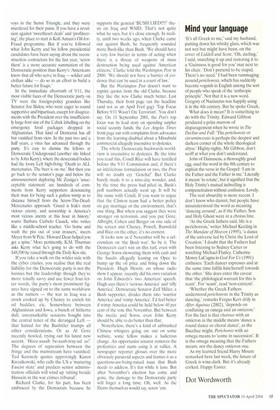Mind your language
'It's all Greek to me,' said my husband, putting down his whisky glass, which was not wet but might have been, on the cover of Liddell and Scott. 'Oh, darling,' I said, snatching it up and restoring it to a 'Guinness is good for you' mat next to his chair. 'Don't pretend to be stupid. There's no need.' I had been rummaging around perichoresis, which has suddenly become voguish in English among the sort of people who speak of the 'anthropic principle'. Not that it is a new word. Gregory of Nazianzus was happily using it in the 4th century. But he spoke Greek.
What does it mean? It is something to do with the Trinity. Edward Gibbon produced a prize marrow of disparagement when he wrote in The Decline and Fall: 'The perichoresis or circumincessio is perhaps the deepest and darkest corner of the whole theological abyss.' Highty-tighty, Mr Gibbon, don't scoff at what you don't understand.
John of Damascus, a thoroughly good egg, used the word in the 8th century to explain the verse in the Gospel: 'I am in the Father and the Father in me.' Literally it meant 'to rotate', but it signified that the Holy Trinity's mutual indwelling is compenetration without confusion. Lovely.
The real absurdity is more recent. I don't know who dunnit, but people have misunderstood the word as meaning 'dancing around', as if the Father, Son and Holy Ghost were in a chorus line.
'As the Greek fathers said, life is a perichoresis,' writes Michael Keeling in The Mandate of Heaven (1995), 'a dance of the universe led by Christ the Lord of Creation.' I doubt that the Fathers had been listening to Sydney Carter or watching Michael Flatley. Catherine Mowry LaCugna in God For Us (1991) enthuses: 'Each dancer expresses and at the same time fulfils him/herself towards the other.' She does enter the caveat that 'the philological warrant for this is scant'. For 'scant', read `non-existent'.
'Whether the Greek Fathers understood perichoresis in the Trinity as dancing,' remarks Fergus Kerr drily in After Aquinas (2002), 'depends on conflating an omega and an omicron.' For the fact is that choreuo with an omicron in the middle means 'dance a round dance or choral dance', as the Bacchae might. Perichoreo with an omega means to 'come in succession'. It is the omega meaning that the Fathers meant, not the dancy omicron one.
As my learned friend Harry Mount remarked here last week, the future of Greek is wine-dark. But it's already corked. Happy Easter.
Dot Wordsworth


































































 Previous page
Previous page